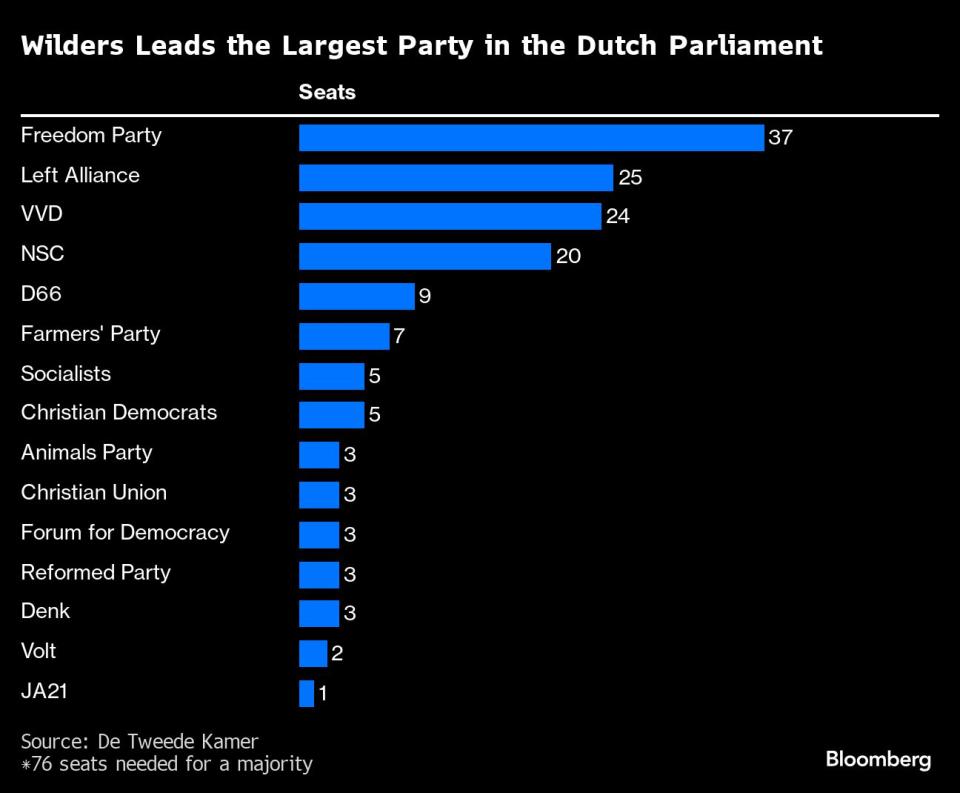Dutch Election Winner Wilders Seals Tentative Coalition Deal
- Oops!Something went wrong.Please try again later.
(Bloomberg) -- Dutch election winner Geert Wilders said he sealed a tentative agreement to form a right-wing coalition government after months of talks but hasn’t yet named a prime minister.
Most Read from Bloomberg
US Inflation Data Was Accidentally Released 30 Minutes Early
Putin and Xi Vow to Step Up Fight to Counter US ‘Containment’
Slovak Premier Fighting for Life After Assassination Attempt
US Inflation Ebbs for First Time in Six Months in Relief for Fed
China Considers Government Buying of Unsold Homes to Save Property Market
“We have a negotiating agreement. But the factions will also discuss it later, so there may be adjustments and amendments,” Wilders said Wednesday after concluding negotiations with three right—leaning parties — the liberal VVD of outgoing Prime Minister Mark Rutte, the center-right NSC and the populist Farmer-Citizen Movement. “After that we may reach a final agreement,” he added.
Wilders’ far-right Freedom Party comfortably captured the most seats in the election almost six months ago, but the controversial politician had been unable until now to assemble an administration. In March, he was forced to renounce his own bid to become premier in order to break a deadlock in the talks.
Wilders said the parties discussed possible candidates for prime minister but “will resume that conversation at a later time.”
Pieter Omtzigt, the leader of the center-right New Social Contract, said the new prime minister may be announced on Thursday.
Policy differences among the four parties could still hamper a final agreement, as well as the functioning of the government, and could become a source of instability for the euro region’s fifth-biggest economy.
The four party leaders have said they don’t plan to take up positions in the cabinet, which is expected to include a mix of political appointees as well as technocrats.
As leader of the largest bloc in parliament, Wilders will wield power behind the scenes, along with his three coalition partners. He has been resolute about his demands for less immigration to the Netherlands and any new government is expected to take a hard line on asylum seekers.
Wilders plans to name a lead negotiator who will take up the premier role and spearhead the cabinet formation, people familiar with the matter told Bloomberg last week.
Ronald Plasterk, a former education and interior minister and currently a conservative columnist for Dutch newspaper De Telegraaf, is one name being touted as Wilders’ pick. Though a member of the Labor Party, Plasterk was chosen by Wilders as the lead negotiator in the first round of formation talks after elections concluded in November. The fact that Plasterk is from another party and his prior experience in government is likely to appease the three right-leaning parties.
Read More: Wilders May Tap Next Dutch Prime Minister as Soon as Next Week
Wilders, known for his anti-Islamic ideology, has been working to push through a consensus after facing multiple setbacks in recent months. He adopted a milder stance during coalition talks, withdrawing some controversial proposals like a ban on the Koran.
In the Nov. 22 election, his party won around a quarter of seats, more than any opinion polls predicted. The most recent surveys indicate that support for him and his party has since grown stronger.
It’s unclear what the scope of the coalition deal entails. The four parties plan to cancel a 15% tax on share buybacks that was adopted last year, people familiar with the matter said this week. They have also agreed to undo a decision to shrink tax breaks for expatriates. Several Dutch companies have in recent months railed against the buyback tax and expatriate tax benefit cuts saying it would impact Dutch competitiveness.
--With assistance from Katharina Rosskopf.
(Updates with details from eighth paragraph)
Most Read from Bloomberg Businessweek
©2024 Bloomberg L.P.



